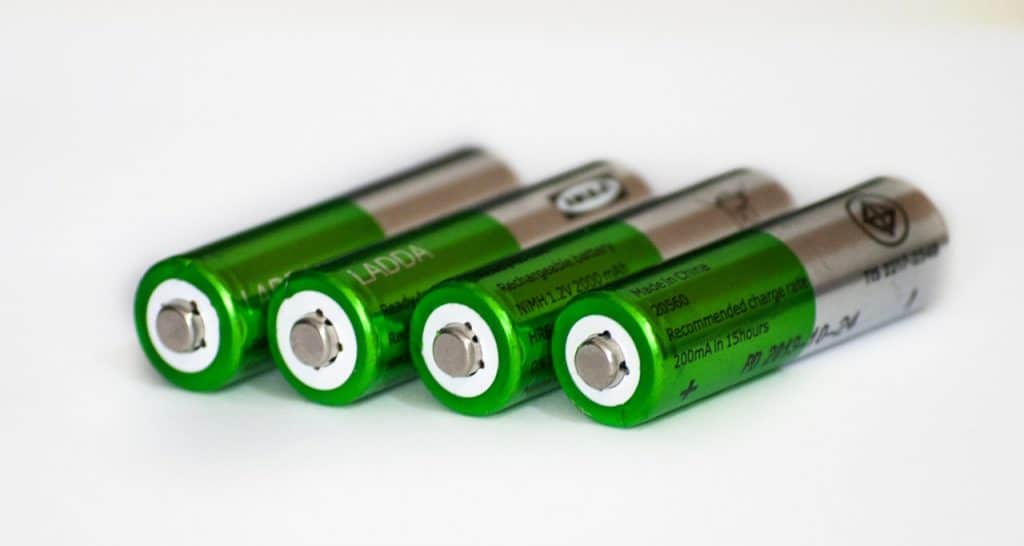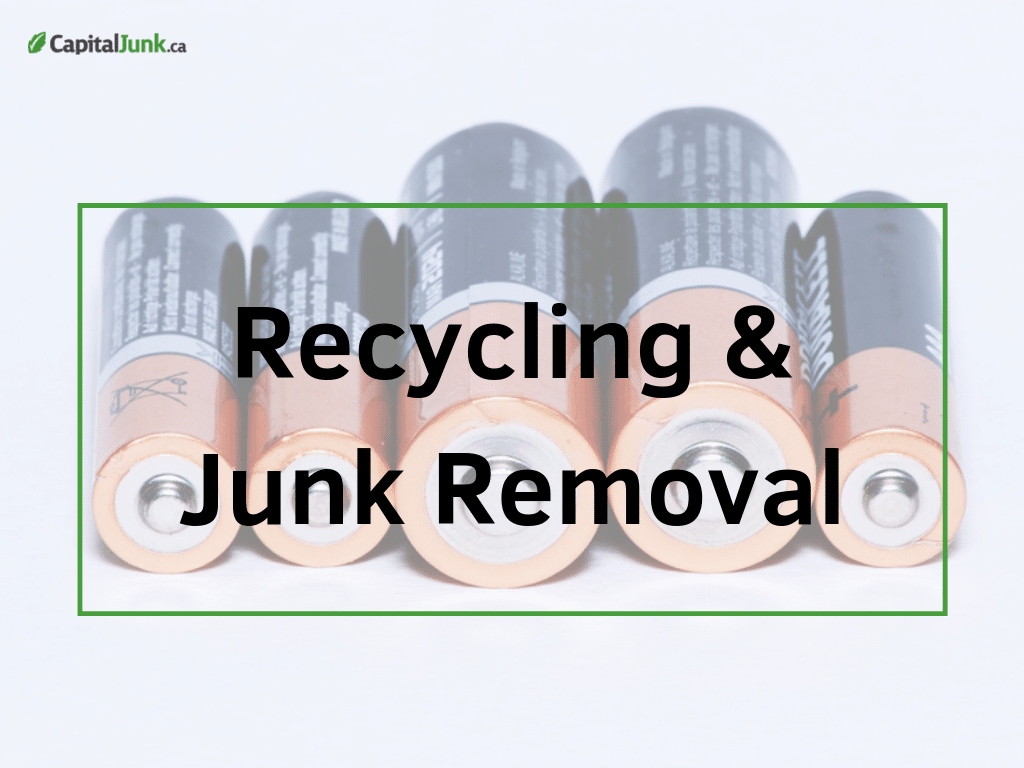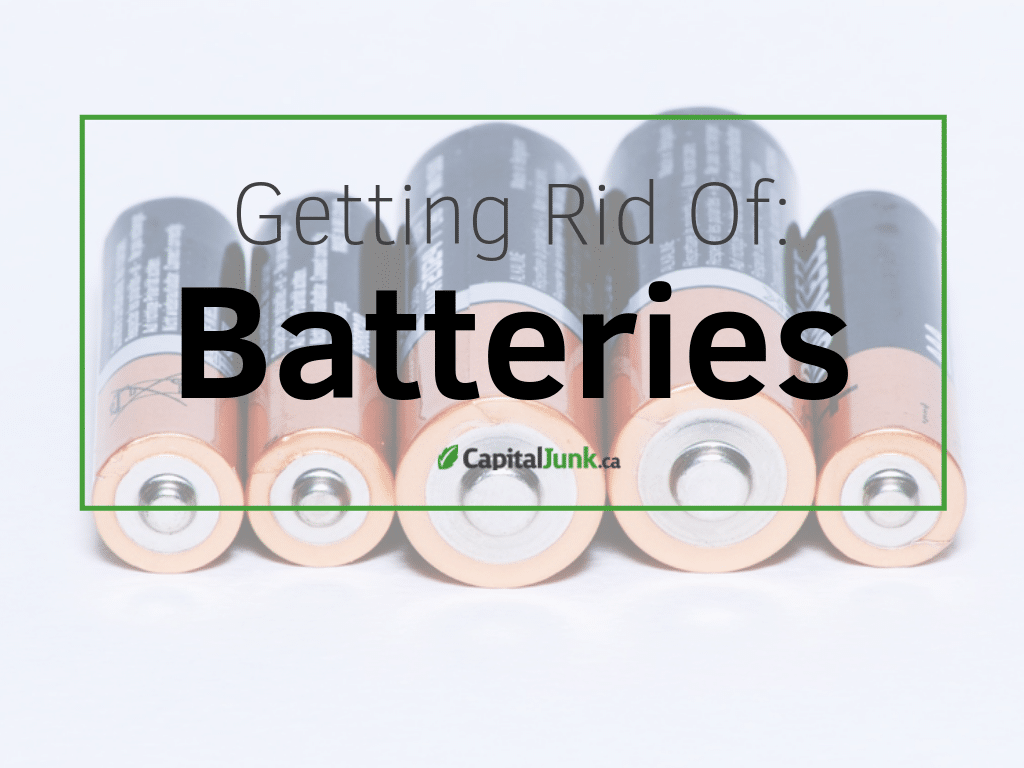It’s time to purge that drawer in your home that’s full of old batteries — but before you do, there’s a lot you need to know. After all, there are various types of batteries that the average homeowner has in their home — and not all of them can be disposed of the same way.
The thing about batteries is that they leak out battery fluid — this why the safe recycling and disposal of your batteries is so important. Especially when mixed with other materials, your batteries can pose major health and fire risks.
Fortunately, in compliance with the 1996 Battery Act, batteries now contain significantly fewer hazardous materials like heavy metal. That said, there are still certain batteries that can be harmful if not disposed of properly.
At Junk Ninja, we are committed to keeping your home and the environment clean — which is why we carefully assess every individual item that we collect. Feel free to call us anytime to learn more about what we take, our services, and what you can expect when you work with us!
We take some batteries as part of our scrap metal removal services, but there are also hazardous batteries that we do not accept. These hazardous batteries need to go to drop-off centers that have the resources to extract their harmful components and retrieve their materials that can be re-used.
Due to the different types of batteries that can be found in a home and their varying materials, there are a few things you’ll need to understand before purging what’s become your old battery drawer.
What Are Batteries Made Of?
According to Duracell, batteries are comprised of highly engineered electrochemical cells. Through a redox reaction, a battery’s chemical energy is converted into electrical energy. This is how batteries keep your devices running!
A battery’s three main parts are:
1: The anode (Metal)
2: Cathode (Metallic oxide)
3: Electrolyte (The salt solution that enables the flow of ions)
Materials vary from battery to battery, but the purpose and concept remain the same.

When to Get Rid of Batteries:
Food has an expiration date — and so does your battery. While some batteries have a short lifespan, others can be recharged multiple times before needing to be replaced. Certain warning signs will indicate it’s time to get rid of your battery:
- You no longer need a battery operated product
- The battery has no charge left
- The battery is damaged
Getting Rid of Different Types of Batteries:

There is no denying the importance of safe battery recycling, which is why it’s essential that you are aware of the different types of batteries you may have in your home, and how to dispose of them properly.
Letter Name Batteries
How to get rid of them: Toss them in your garbage or return them to a retailer.
AA, AAA, C and D batteries — Letter name batteries — were once considered hazardous because they were made with heavy metals like nickel, cadmium, lead and mercury. Now, however, these batteries are made of steel, manganese and zinc.
Widely used battery brand Duracell eliminated mercury from its products back in 1993. The brand has adopted strict, environmentally friendly practices; its alkaline batteries don’t pose any environmental or health risk.
Since they don’t contain hazardous materials, you can toss these batteries with the rest of your trash — that said, some retailers will also take them back for recycling purposes.

Button Batteries
How to get rid of them: Return to a retailer
Button batteries include small levels of mercury and are typically found in medical devices, watches and toys. These batteries must be recycled properly to ensure that the mercury is retrieved and not sent to a landfill where it can contaminate the environment.
That said, various retailers like Canadian Tire, Home Depot and The Source will take button batteries back for proper recycling.
Car Batteries
How to get rid of them: Drop off at a depot or retailer for recycling
According to Business Insider, 98% of car batteries get recycled — this makes sense considering the battery is one of a car’s most expensive parts.
Car batteries are lead-acid batteries that contain — you guessed it — lead and acid. These batteries need to be carefully disposed of to prevent these harmful materials from being released into the environment.
Needless to say, these batteries can’t be tossed into a garbage bag or into your green bin. Fortunately, many retailers that sell car batteries will take them back after they are used to make sure they are recycled properly.
Examples of businesses willing to take your used car battery include Midas and Mr. Lube. Canadian Tire will also take your car battery, but only if you are replacing it with a new one from the store.
Rechargeable Batteries
How to get rid of them: Dispose of them at a collection site
Rechargeable batteries are considered household waste, as they tend to contain nickel cadmium. This material will contaminate air, water and the soil if sentenced to a landfill.
An example of a rechargeable battery is a lithium-ion battery, which is commonly used in portable electronics and vehicles. These batteries sustain portable devices like mobile phones because they have high energy density.
The thing is, according to Recycling International, the production of lithium-ion batteries was worth over 36 billion dollars in 2018 alone. It’s important not to be wasteful and to make sure that these batteries are recycled and repurposed properly.
That said, these batteries can be incredibly harmful if tossed into the garbage with the rest of your trash.
Rechargeable batteries need to be recycled through a retailer or approved drop site because, as proven by Minnesota fires started by improper battery recycling, if put into a green bin, these batteries pose a major fire risk.

Before Getting Rid of Batteries:
Whether you are tossing your batteries into the garbage or bringing them to a hazardous waste depot,
there are certain precautions to take before getting rid of them.
Tape the Ends: It’s important to tape the ends of your batteries to prevent them from coming into contact with other batteries.
When a battery dies, it can still have spark left. It can be disastrous if an active battery comes into contact with another active battery.
Pack Them in a Bag: If you are bringing a bunch of old batteries to a disposal site, every battery should be put in a clear plastic bag so it can be disposed of separately.
Keep Them Cool: Collecting multiple old batteries before you drop them off at a depot or a retailer? That’s a great idea! Just make sure that you are keeping your batteries in a cool space because, if heated, batteries can react dangerously.
What Not to Do with Your Batteries:
Batteries keep your most important devices running — so needless to say, they are incredibly powerful. With such strength, however, comes responsibility. There are certain things that you should avoid altogether when it comes to your batteries.
Mixing Old & New Batteries: Under no circumstance should you mix an almost dead battery with a new one — this can cause a rupture or a leak. If you are replacing one battery in a device, replace the rest while you are at it or wait for all batteries to die.
Take Them Apart: However curious you may get, never take apart a battery. Batteries contain harmful components that upon contact can injure you or cause a fire.
Recycling Batteries
It is essential that you bring your batteries to a retailer or depot to be properly recycled. Although they contain harmful materials, they also boast valuable parts that can be recovered and re-used.
In fact, according to Global News, 92 percent of a battery’s components are recyclable. When these batteries are responsibly recycled, they are less likely to release heavy metals like mercury and cadmium.
It’s important to note that recycling batteries doesn’t mean putting them in your green bin with your plastic water bottles and cardboard boxes. These batteries need to be recycled at a specific site where their harmful materials can be treated properly, and their valuable parts can be recovered without releasing harmful toxins.
Getting Rid of Your Batteries through Junk Removal:
Junk Ninja offers scrap metal removal services to get rid of your batteries that are not hazardous. We bring everything we collect to a local facility to ensure that every item is treated properly. The landfill is always the last possible option.
We are happy to take anything off of your hands that isn’t hazardous. All you have to do is book your appointment, and we’ll present you with a two-hour time slot — don’t worry, we’ll give you a courtesy call 15 minutes before we arrive.
Once we get to you, we will assess the situation and present you with a complimentary, no-obligation quote. Rest assured, we boast fair pricing that’s based solely on how much room your stuff takes up on our truck.
When you give us the green light, all you have to do is point us in the direction of what you want to be hauled away and we’ll remove everything to leave your home mess-free.
With our professional junk removal services, we are proud to serve the Ottawa area. Contact Junk Ninja for the following Junk Removal Services:-
➤ Junk Removal ➤ E-Waste Removal
➤ Appliance Removal ➤ Hot Tube Removal
➤ Furniture Removal ➤ Yard Waste Removal
➤ Renovation Cleanup ➤ Deck Removal
➤ Hoarding Cleanup ➤ E-State Cleanup
Would you like to know more about the Ottawa Recycling, Removal, and Disposal Guide and also want to contribute to the fight against climate change? Find out what can be recycled in Ottawa, where to find recycling depots, and how to reduce your waste in this helpful guide.You can also check our Complete Guide to Junk Removal In Ottawa.
